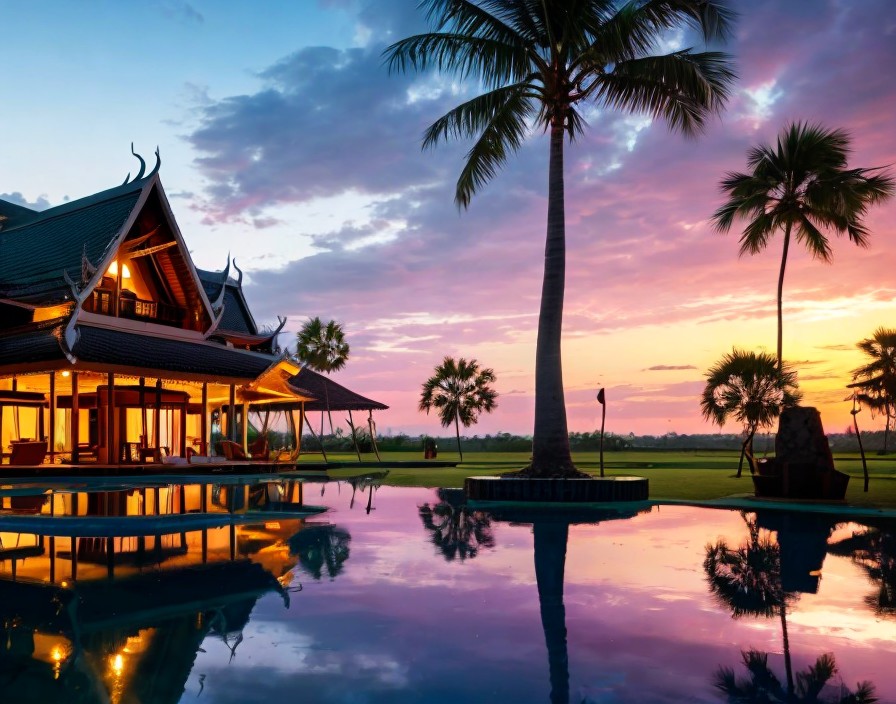The idyllic allure of Southeast Asia continues to captivate travellers worldwide. Pristine beaches, vibrant cultures, and ancient temples offer a sensory feast for the adventurous spirit. However, discerning globetrotters in the 21st century seek experiences that go beyond the postcard-perfect. Sustainability has become a critical factor, with responsible tourism practices a top priority. Atmaland Resort, nestled in the verdant embrace of Kep National Park, Cambodia, emerges as a frontrunner in this domain, seamlessly blending luxurious comfort with eco-conscious principles.
Cambodia’s eco-tourism landscape
Cambodia’s tourism industry has witnessed a remarkable surge in recent years. According to the World Travel and Tourism Council (WTTC), the sector’s contribution to the country’s GDP reached a staggering 21% in 2023. This growth, while positive for the economy, necessitates a focus on responsible development. The Cambodian government has acknowledged this need, implementing the “Sustainable Tourism National Action Plan 2020-2023.” This initiative prioritizes the conservation of natural resources, community engagement, and the promotion of cultural heritage.
Atmaland Resort embodies this commitment. Nestled on the foothills of the National Park, amidst lush greenery and boasting breathtaking sea views, the resort prioritizes the preservation of its natural surroundings.
Bungalows built with nature in mind
Atmaland’s eight luxurious bungalows are not merely aesthetically pleasing; they are constructed with sustainability at their core. Locally sourced, recycled materials are used extensively, minimizing the resort’s environmental footprint. The bungalows themselves are designed to maximize natural ventilation, reducing reliance on air conditioning. This not only conserves energy but also fosters a connection with the surrounding environment.
The resort’s commitment extends beyond construction practices. Lush gardens brimming with native flora create a haven for local wildlife. Guests can lose themselves in the symphony of bird calls and the gentle rustle of leaves, a stark contrast to the hustle and bustle of everyday life.
Embracing responsible practices
Atmaland champions a holistic approach to sustainability. Water conservation is a key focus, with low-flow showerheads and rainwater harvesting systems implemented. The resort actively reduces waste generation by encouraging reusable water bottles and composting organic waste.
The resort’s dedication extends to its culinary offerings. Atmaland boasts an on-site restaurant renowned for its delectable Khmer and Western fare. Fresh, locally sourced ingredients take center stage, minimizing transportation emissions and supporting local farmers. Guests can savor the region’s vibrant flavors while knowing their choices contribute to the economic well-being of the community.
Sustainable spa treatments and cultural immersion
Atmaland’s spa treatments offer a unique fusion of pampering and eco-consciousness. Utilizing locally sourced, organic products, guests can indulge in rejuvenating massages and facials, all while minimizing the environmental impact often associated with spa experiences.
The resort’s commitment extends to cultural immersion. Guests can embark on guided tours to nearby villages, gaining insights into the rich tapestry of Cambodian life. Learning traditional crafts, experiencing local cuisine, and interacting with villagers fosters cross-cultural understanding and promotes the economic well-being of the community.
The Kep National Park
Kep National Park, a jewel in Cambodia’s crown, offers a plethora of adventure activities for the intrepid explorer. Hiking trails weave through the verdant landscape, leading to cascading waterfalls and hidden coves. Biking enthusiasts can explore the scenic coastal routes, while kayaking provides a unique perspective of the mangrove forests teeming with life.
Responsible tourism practices are encouraged within the park. Atmaland partners with local tour operators who prioritize the conservation of the natural environment. By opting for these guided tours, guests ensure their exploration leaves minimal impact on the delicate ecosystem.
A model for responsible tourism
Atmaland Resort serves as a beacon of hope, demonstrating that luxurious hospitality can co-exist with environmental responsibility. Its commitment to sustainability extends far beyond mere marketing buzzwords. From the construction of its bungalows to its dedicated staff and focus on local partnerships, the resort sets a high bar for the industry.
The global tourism industry is at a crossroads. As travel demand continues to surge, responsible practices become ever more crucial. Atmaland Resort offers a blueprint for a sustainable future, showcasing how luxury can be redefined through an eco-conscious lens.
A destination for the discerning traveller
In today’s world, discerning travellers seek experiences that enrich their lives while minimizing their impact on the planet. Atmaland Resort caters to this growing demographic. It offers a sanctuary – a place to unwind, reconnect with nature, and immerse oneself in the rich tapestry of Cambodian culture – all while adhering to the highest standards.
The cost of paradise
While Atmaland Resort undeniably sets a high standard for sustainable luxury travel, it is essential to acknowledge the inherent complexities associated with tourism’s environmental impact.
Carbon footprint considerations
Travel, by its very nature, generates a carbon footprint. Air travel, particularly long-haul flights, contributes significantly to greenhouse gas emissions. Atmaland’s commitment to sustainability cannot negate the environmental cost of reaching the resort.
For travellers seeking to minimize their carbon footprint, offsetting emissions is an option. Reputable organizations offer opportunities to invest in renewable energy projects or tree-planting initiatives that sequester carbon dioxide. While not a perfect solution, offsetting can mitigate the environmental impact of air travel.
Beyond the walls
Atmaland’s partnership with local tour operators for exploring Kep National Park is a commendable initiative. However, responsible tourism extends beyond organized tours. Travellers can contribute by being mindful choices throughout their stay. Opting for bicycles or guided walks over motorized vehicles for exploring the surroundings minimizes emissions.
Respecting the natural environment is paramount. Refraining from littering, adhering to designated trails, and avoiding disturbing wildlife are all essential practices. Responsible waste disposal is equally important. Atmaland’s composting efforts create a positive example, but tourists should minimize waste generation and utilize designated bins appropriately.
Empowering local communities
Sustainable tourism thrives on the well-being of local communities. Travellers can contribute by patronizing local businesses beyond the resort. Visiting village markets, purchasing locally made crafts, and opting for homestays when feasible injects tourism revenue directly into the local economy. Engaging with the community fosters cultural exchange and empowers local residents to play a pivotal role in tourism development.
A journey towards sustainable luxury
Atmaland Resort stands as a testament to the potential of sustainable luxury travel. However, achieving true eco-tourism requires a collective effort. Travellers must be responsible stewards, actively minimizing their environmental impact. Collaboration between resorts, local communities, and governing bodies is crucial to ensure tourism benefits both the environment and the local population.
For the discerning traveller seeking an enriching and transformative experience, Atmaland Resort offers a compelling proposition. It is a destination that invites guests to reconnect with nature, immerse themselves in a vibrant culture, and embrace a new definition of luxury – one intertwined with environmental responsibility. The journey towards true sustainability is ongoing, and Atmaland paves the way for a future where luxury and eco-consciousness go hand in hand.
Photo credit: René Cortin – Flickr – Wikimedia Commons


